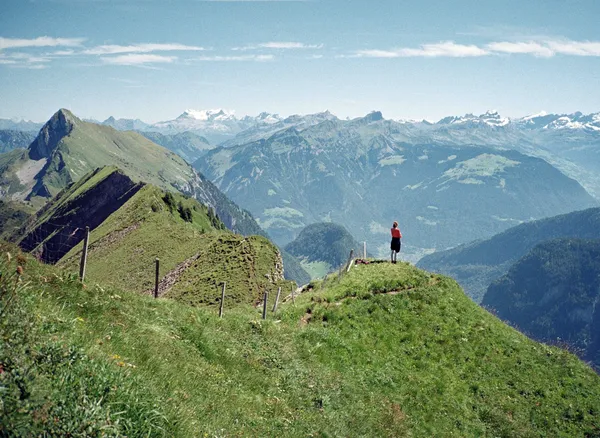 |
| A Piece Of Sky Photo: Armin Dierolf, courtesy of Hugo Film |
Sometimes small scale films have a much bigger impact than anybody expected. That’s the case with Michael Koch’s A Piece Of Sky (aka Drii Winter), which is currently screening at the Leeds International Film Festival and has been named Switzerland’s official submission for the 2023 Oscars. It’s the story of farmhand Marco (Simon Wisler), who undergoes a process of mental and physical disintegration as a result of an inoperable brain tumour, and of Anna (Michèle Brand), the wife who chooses to stand by him although she also has a daughter to look after and the initial sympathy of her community gradually gives way to approbation.
Meeting up with Michael and Michèle to discuss the film, I began by congratulating them on the incredibly powerful sense of place which it conjures up, and asking Michael if his decision to shoot it in square format related to the fact that many scenes are set on steep mountain slopes.
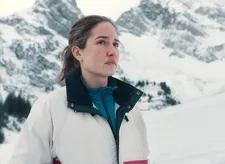 |
| Michèle Brand as Anna Photo: Armin Dierolf, courtesy of Hugo Film |
“Yeah, it's true,” he says. “We decided to to shoot the film in this format because I think it's close to the place, to the vertical line in the frame. In this narrow valley, with the steep hills, the vertical line is much more important and I think I was wanting to find the format to underline this a little bit. And for me, it's also a quite an interesting format to portray. The film is, besides the love story, for me really a portrait about the people in this mountain world, and also about the place. It portrays how people work and live in this place.
“It would be maybe easy with a cinema with a wider frame to just like, blow away the audience by the fantastic mountain landscape, you know? But it's also a little bit dangerous because you lose a little bit the focus on the people and actually there's a theme for me, it's really about the mountain people and that's why I wanted to to be more focused and we decided to use this format for the work.”
I ask Michèle if that intense focus on the characters was what attracted her to the role, but she explains that for her, the decision was much simpler.
“In normal life I'm an architect. Then I read about it in the newspaper and was just told a bit about the story, and that it will be placed at somewhere in Uri, where I live. And I cannot explain it, really, but it was a really strong feeling for me that I wanted to be a part in this project. I did not know about the framing or what Michael had in mind. More a feeling.”
Michael nods. “And I was so happy that she responded to this ad we had in the local newspaper because it was really hard to get good people into the film, non-professionals, and then Michèle was the only one who reacted that way. All the other people, I had to persuade them during years till they said ‘Yes okay, we're going to be part of the film.’ Because especially the farmers, they have a lot of work to do in summer, so for them acting in a movie and spending time on the set was not what they could afford, actually.
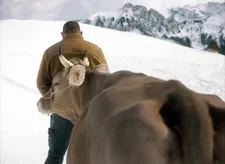 |
| Marco at work Photo: Armin Dierolf, courtesy of Hugo Film |
“I really wanted to have these real people in it because I think it makes a difference. We read in their faces and their bodies what it means living at this place, working on the steep hills in this nature, and so that was important for me.
“You put the question about the sound and I think it is also quite an important part of the whole movie, like the music and the choir, which helps me to structure the film. My brother [Tobias Koch] composed the music for the choir, but also the whole sound design. This intense experience you have during watching the film is because he did an amazing job in creating a sound design which gives you the opportunity to really dive into these images. The sound design, keeps it together, it creates a space, a room, where the images can just stay for a long time. Because it's a quiet, slow paced movie, you know? It creates this atmosphere so you feel comfortable, I think, watching for quite a long time the same images.”
A lot of directors lack the nerve to take things so slowly, I note. It’s a very effective approach here, but what gave him the confidence to pull it off?
“I think it's connected to the mountain experience I have when I'm in the mountains,” he says. “It's this stillness, calmness, which gives me also something really peaceful. I wanted to share a little bit the mountain experience I have when I was in the mountains with the audience. And that's why I decided to tell the story in a slow pace with this moment of stillness. Also to connect a little bit to the great composure Anna has in the way she reacts to what happens, to these challenges, you know?
“It's a big challenge for her to cope with Marco and her daughter, that responsibility for a daughter and Marco who's, like, doing crazy stuff. And so she finds herself in a quite challenging situation. And I think she copes quite great with it. It’s a great human gesture, how she, in the end, finds a way back to Marco and accompanies him through his last days.”
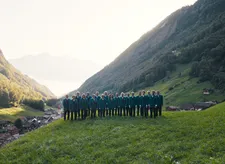 |
| The choir Photo: Armin Dierolf, courtesy of Hugo Film |
It’s also really challenging from an acting perspective because for a lot of that time, Anna doesn’t really have anyone she can talk to about her feelings, so Michèle has to find other ways of sharing them with the audience. Michael was very helpful with that, she says.
“We had a lot of time to shoot the scenes, and we would get together every morning before we shoot every scene, and talk through and reflect in which part Anna is right now. And that helped me a lot to get really into into this challenge she has, and the society wanting something different. She kind of had to be strong on her own, and get her strength going through the situation, but I think that was really nice, because we had so much time to get into the roles.”
There’s also a wonderfully fresh performance there from Elin Zgraggen, who plays Anna’s young daughter, Julia. How did they go about working with her?
“For me, it's was a gift how she acted so natural,” says Michael. “She puts a lot of life into the movie. I think that's wonderful. And I think she made a great job together with her mum, she was really well prepared. She could speak all the dialogue of all the characters in the film. So every time when Michèle or Simon forgot the dialogue, she would remind them and tell them what they have to say. So it was also really funny to work with her because she was so lively and she was so natural and yes, I think it's also a little bit that we were like a little family.
“During the shooting, there were only ten people on the set from the crew, and then the cast. And it was really an intimate space where we worked on it. And we had a lot of time, so it was quite intense and special. Also because we shot during the pandemic and so we were all in the same situation and just wanted to get the best we can. It was like this intimate family spirit on the set.”
“Elin is such a nice girl, and very open to new people. That made it really easy to connect with her and to get this bond,” adds Michèle.
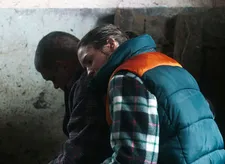 |
| Anna and Marco together Photo: Armin Dierolf, courtesy of Hugo Film |
“Some scenes, we did a lot of takes,” says Michael. “Often 15 or 20 cakes, and Michèle and Simon, after 15 or 20 takes they told me, ‘Okay, now it's okay, so maybe we just leave it like this.’ And it was always Elin telling me ‘Oh no, I want to do it once again, I want to do it!’” They both laugh.
“It was really interesting for me, also, during the editing process, that it was always like this: the best take of Michèle was often was the first or the second one, because Michèle has a great ability to be so authentic and spontaneous, also to just get herself into the moments. I think it's something really great she does, it's so special. Also delicate, in a way. And Simon was a little bit different. He needed really a lot of takes in order to get used to the way we shot the film. And yeah, he had to be like, authentic in a way. It was interesting how the non-professionals were so different. I was lucky to have to have so much time to shoot the film so I could really cope with each actor in a different way. I had the time to react differently to the different characters on the set.”
So how do they feel about representing Switzerland at the Oscars?
“For me, it's a great surprise,” says Michael. “And I'm really happy about the echo the film has now. It's so exciting. It's so great, because the film is based so locally, and now we have this huge echo from all over the world and we are representing Switzerland for the Oscars, so that's so nice. I'm really proud for the cast, for the non-professional actors, for the small team, and I’m happy that I can be here.”
“For me, it's just a bit surreal,” says Michèle. “I never expected that. And I just, I am honoured that I could be a part of this process.”
“A really important part, I have to say,” adds Michael. “Obviously, it would not be the film we have now withour Michèle, but she was so important for me and for the whole project.”





















